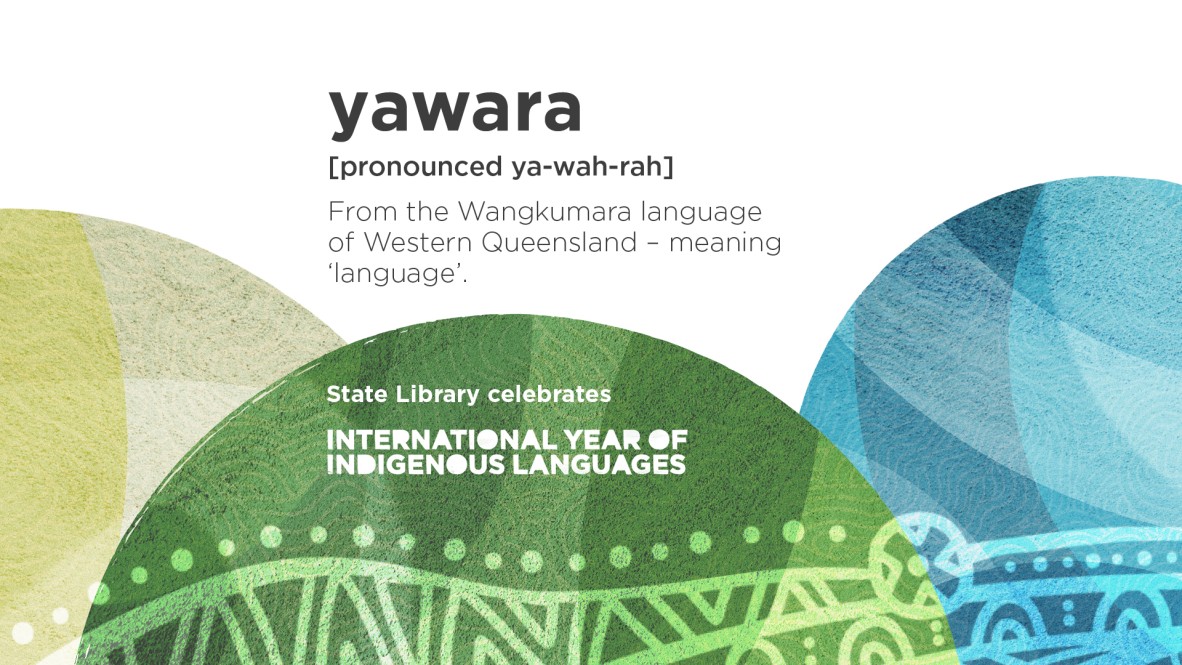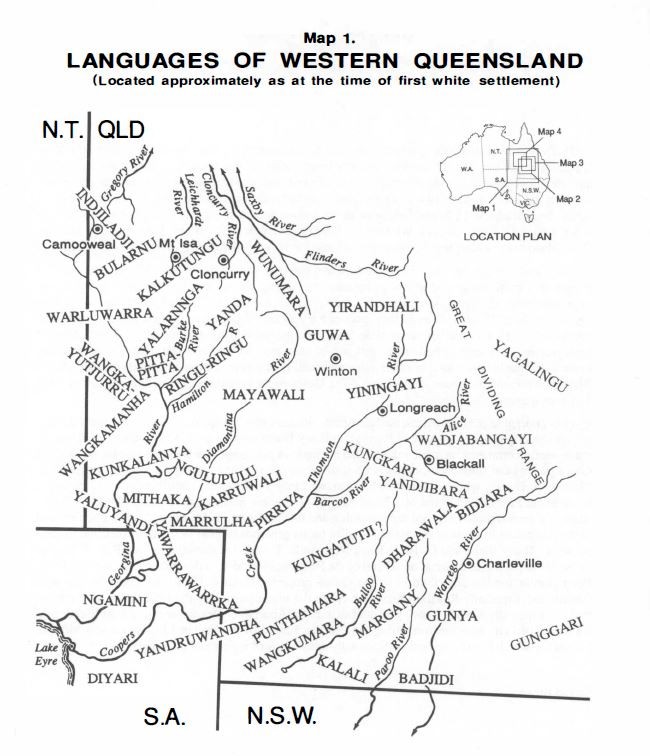2019 International Year of Indigenous Languages: Word of the Week - Week Six.
By administrator | 5 February 2019
As part of State Library's commitment to the 2019 International Year of Indigenous Languages, we will be promoting a 'word of the week' from one of the 125+ Aboriginal and Torres Strait Islander languages and dialects from across Queensland.

State Library's IYIL2019 Word of the Week: Week 6.
State Library's word of the week for Week Six is yawara which is from the Wangkumara language of Western Queensland - it means 'language'. It is also recorded in neighbouring language groups including Yandruwandha and Punthamara with similar meanings referring to 'language' or 'talking in language'. A neighbouring language in North-East South Australia near the Queensland border is known as Yawarawarka and is based on yawara meaning 'word or language' and waka meaning 'small'. Further south into North-Western NSW, yawara means 'word' in Barkindji/Paakantyi.

Basic materials in Wangkumara (Galali) - McDonald and Wurm, (1979).
There has been some linguistic work undertaken on the Western Queensland languages. Wangkumara is often referred to as Galali - the image above is from the work of McDonald and Wurm; the text provides grammar as well as information on vocabulary and sentence structure. While State Library does not hold a print copy of this text, it is available online.

Languages of Western Queensland - Breen (1990).
Breen in his work Salvage Studies of Western Queensland Aboriginal Languages includes the above map of Western Queensland languages and shows Wangkumara along the Wilson River which flows into Cooper's Creek south of Eromanga. Breen also refers to a second dialect of Galali located to the east along the Bulloo River and suggests there was movement across the region during the 1800's.
State Library of Queensland invites you to celebrate the 2019 International Year of Indigenous Languages as we raise awareness of the rich diversity of Queensland’s Aboriginal and Torres Strait Islander languages.
Join the conversation as we post a new word for each week!
Week Six 5-11 February 2019.
#IYIL2019 #IYIL #IY2019WordoftheWeek #SLQIndigenousLanguages
Desmond Crump
Indigenous Languages Coordinator, State Library of Queensland
State Library of Queensland Aboriginal and Torres Strait Islander Languages Webpages
State Library of Queensland Aboriginal and Torres Strait Islander Languages Map
UN IY2019 Links
UN International Year of Indigenous Languages webpages
UN International Year of Indigenous Languages Resources
References
The word of the week has been sourced from the following linguistic texts in the State Library collections.
Sources: McDonald, M. and Wurm, S. A. (1979) Basic materials in Wangkumara (Galali): grammar, sentences and vocabulary. Online version.
Breen, J.G. (1990) Salvage Studies of Western Queensland Aboriginal Languages. J 499.15 bre
Further Reading
Other materials in the State Library collections relating to Wangkumara and neighbouring languages include the following:
Breen, J.G. (1990) Salvage Studies of Western Queensland Aboriginal Languages. J 499.15 bre
Conrick, P. (1988) Dictionary of Dieri-Yantrawantra-Wangkumara tribes of the Cooper-Tibooburra-Innamincka areas. Q 499.15 con
Curr, E. M. (1887) The Australian Race: its origins, languages, customs, place of landing in Australia and the routes by which it spread itself over that continent. RBF 572.994 cur
Harrison, G. (1991) Wangkumara alphabet book. PAM 499.15 1981
Hercus, L. (1994) A grammar of the Arabana-Wangkangurru language, Lake Eyre Basin, South Australia. G 499.15 1994
Holmer, N. (1988) Notes on Some Queensland Languages. J 499.15 HOL
McDonald, M. and Wurm, S. A. (1979) Basic materials in Wangkumara (Galali): grammar, sentences and vocabulary. Online version.
Robertson, C. (1985) Let's learn Wangkumara! Q 499.15 ROB
Comments
Your email address will not be published.
We welcome relevant, respectful comments.